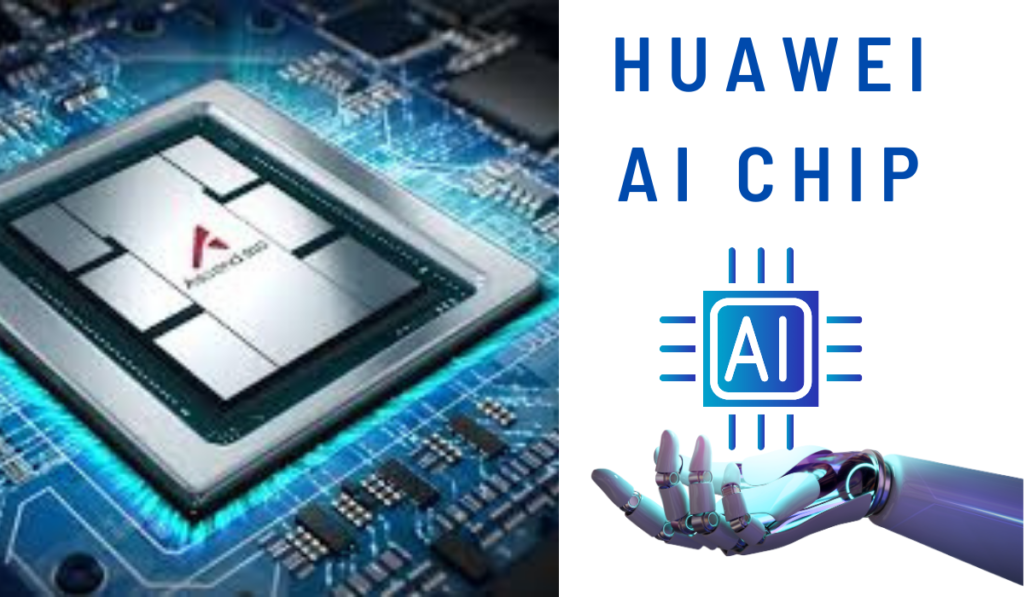In a seismic shift that’s sending ripples through the tech world, the Huawei AI chip competition has taken center stage, challenging the long-standing dominance of industry titan Nvidia. At the heart of this technological tempest lies Huawei’s latest creation – the Ascend 910C – a chip that’s not just pushing boundaries but potentially redefining them. This bold move sets the stage for an epic showdown that could reshape the future of artificial intelligence and global tech leadership.
As the battle lines are drawn between the United States and China, we find ourselves witnessing more than just a corporate rivalry. The Huawei AI chip competition represents a pivotal moment in the ongoing struggle for technological supremacy between two global superpowers. It’s a high-stakes game where the prize isn’t just market share, but the power to shape the future of AI and, by extension, the global technological landscape.
The Challenger Emerges: Huawei’s Ascend 910C
The Ascend 910C isn’t just another entry in the Huawei AI chip competition; it’s a statement of intent from a company that refuses to be sidelined by international restrictions. Let’s delve into what makes this chip a potential game-changer:
- Performance Prowess: Designed to go toe-to-toe with Nvidia’s flagship H100 chip, the Ascend 910C is setting new industry standards.
- AI Acceleration: With its advanced transformer engine, this chip is tailor-made for training AI models and processing vast amounts of data.
- Market Positioning: In a Chinese market where Nvidia’s high-end chips are restricted due to US sanctions, the Ascend 910C fills a crucial gap.
- Technological Independence: The chip represents a significant step towards China’s goal of technological self-reliance.
Early Adopters and Promising Results
The tech industry is watching closely as major players put the Ascend 910C through its paces:
- ByteDance, the company behind TikTok, is rigorously testing the chip’s capabilities.
- BYD, a leading electric vehicle manufacturer, is exploring its potential applications in automotive AI.
Early results are turning heads. There are whispers in tech circles that the Ascend 910C might not just match the H100 but potentially exceed it in key AI tasks. This has sent shockwaves through the industry, with many wondering if we’re witnessing the birth of a new AI chip superpower.
Nvidia: The Reigning Champion
To fully appreciate the significance of the Huawei AI chip competition, we need to understand Nvidia’s current position in the market:
- Market Dominance: For years, Nvidia’s GPUs have been the gold standard for AI tasks, from deep learning to large-scale data analysis.
- Technological Edge: The H100 chip has set the benchmark for high-level AI performance, powering some of the most advanced AI systems globally.
- Global Reach: Despite facing restrictions in certain markets, Nvidia has maintained its competitive edge by creating specialized versions for the Chinese market, like the H20 chip.
- Innovation Pipeline: Nvidia’s continuous investment in R&D has kept them at the forefront of AI chip technology.
The Blackwell Platform: Nvidia’s Next Move?
Amidst the intensifying Huawei AI chip competition, rumors are swirling about Nvidia’s next move. The company has hinted at a new platform called Blackwell, but details remain scarce. As one Nvidia executive clarified:
“Blackwell is not a chip. Blackwell is the name of a platform. People think we make GPUs, and we do.”
This cryptic statement has left many speculating about what Nvidia has up its sleeve to counter Huawei’s challenge. Will Blackwell be the answer to the Ascend 910C, or does Nvidia have something even more revolutionary in the works?
The Global Tech Chess Game
The Huawei AI chip competition is more than just a battle for market share; it’s a microcosm of the larger geopolitical tensions between the United States and China. Here’s why this matters on a global scale:
- Technological Independence: For China, developing chips like the Ascend 910C is key to achieving technological self-reliance and reducing dependence on Western technology.
- Economic Implications: The AI chip market is worth billions, and dominance in this field can translate to significant economic power and influence.
- National Security Concerns: Advanced AI chips play a crucial role in military systems, cybersecurity, and national defense strategies.
- Innovation Catalyst: The competition is driving rapid advancements in AI technology, potentially accelerating breakthroughs in various fields.
The Impact of US Sanctions
The US government has implemented strict rules on exporting AI technology, particularly to China. These sanctions have had far-reaching effects:
- Limited Huawei’s access to advanced technology and materials needed for chip production
- Forced Chinese companies to seek domestic alternatives, spurring local innovation
- Intensified the race for technological supremacy between the two nations
- Created a complex web of supply chain challenges for global tech companies
Challenges and Uncertainties in the Huawei AI Chip Competition
Despite the excitement surrounding the Ascend 910C, Huawei faces significant hurdles in its quest to challenge Nvidia’s dominance:
- Production Capability: Designing a cutting-edge chip is one thing; mass-producing it to meet global demand is an entirely different challenge.
- Supply Chain Issues: US sanctions have disrupted Huawei’s access to critical components and technologies, potentially impacting production scalability.
- Market Adoption: Will companies risk investing in technology that could become unusable if new sanctions are imposed?
- Ecosystem Development: Building a robust ecosystem of software and tools to support the new chip architecture is crucial for widespread adoption.
The Ripple Effect
The Huawei AI chip competition doesn’t exist in a vacuum. Its impact reverberates through the entire tech ecosystem:
- Suppliers and Manufacturers: Companies in the semiconductor supply chain must navigate the complex geopolitical landscape while meeting the demands of this high-stakes competition.
- Cloud Service Providers: The performance and availability of these new chips could reshape the competitive landscape in cloud computing and AI-as-a-service offerings.
- AI Researchers and Developers: The availability of more powerful and diverse AI chips could accelerate AI research and application development.
- End-Users: Businesses and consumers may benefit from more choices and potentially lower costs as competition intensifies.
The Future of AI and Global Tech Leadership
As the Huawei AI chip competition unfolds, several critical questions emerge about the future of AI and global tech leadership:
- Innovation Acceleration: Will this intense competition lead to faster breakthroughs in AI chip technology and related fields?
- Market Dynamics: How will the global AI chip market evolve? Will we see a more fragmented market or the emergence of new dominant players?
- Ethical and Regulatory Challenges: As AI chips become more powerful, how will governments and organizations address the ethical implications and potential misuse of advanced AI technologies?
- Collaborative Possibilities: Despite the competitive nature, are there opportunities for collaboration that could benefit the global AI community?
Potential Scenarios
Let’s explore some potential outcomes of the Huawei AI chip competition:
- Huawei Ascendant: If Huawei overcomes production challenges and delivers on the promise of the Ascend 910C, we could see a significant shift in the AI chip market, especially in China and emerging markets.
- Nvidia Reinforces Dominance: Nvidia could leverage its vast resources and ecosystem to maintain its leadership, possibly through groundbreaking innovations in the Blackwell platform.
- Market Fragmentation: The competition could lead to a more diverse AI chip market, with different players dominating various niches or geographical regions.
- Collaborative Breakthrough: Facing common challenges, companies and nations might find ways to collaborate on fundamental AI research, pushing the boundaries of what’s possible.
The Role of Other Players
While the Huawei AI chip competition with Nvidia takes center stage, it’s important to remember that they’re not the only players in this high-stakes game:
Intel: The Sleeping Giant
Intel, a long-standing leader in the CPU market, has been making significant strides in the AI chip space:
- Development of specialized AI accelerators
- Acquisition of AI chip startups to bolster their capabilities
- Leveraging their manufacturing expertise to compete in the high-performance computing market
AMD: The Dark Horse
AMD has been gaining ground in both the CPU and GPU markets, positioning itself as a strong contender in the AI chip race:
- Increasing market share in the data center GPU market
- Developing AI-optimized architectures to compete with Nvidia and Intel
- Potential for disruptive innovations that could shake up the market
Emerging Startups
The AI chip market has also seen a surge of innovative startups entering the fray:
- Companies like Graphcore, Cerebras, and SambaNova Systems are developing novel architectures specifically designed for AI workloads
- These startups could potentially leapfrog existing technologies, introducing radical innovations to the market
The Broader Implications of the Huawei AI Chip Competition
As we delve deeper into the Huawei AI chip competition, it becomes clear that the ramifications extend far beyond the tech industry:
Economic Impact
- Job Creation: The competition is driving demand for skilled professionals in chip design, AI research, and related fields.
- Investment Trends: Venture capital and government funding are increasingly flowing into AI chip startups and research initiatives.
- Global Trade Dynamics: The AI chip race is reshaping global trade relationships and supply chains.
Technological Advancements
- Edge Computing: More powerful AI chips could accelerate the adoption of edge computing, bringing AI capabilities closer to end-users.
- Quantum Computing Integration: There’s potential for AI chips to play a crucial role in the development of quantum-classical hybrid systems.
- Green Computing: The competition is driving innovations in energy-efficient chip designs, contributing to more sustainable computing practices.
Societal Implications
- AI Democratization: More powerful and accessible AI chips could lead to wider adoption of AI technologies across various sectors of society.
- Privacy Concerns: Advanced AI capabilities raise new questions about data privacy and surveillance.
- Education and Workforce: The evolving landscape necessitates changes in educational curricula and workforce training to meet the demands of an AI-driven future.
A New Chapter in Tech History
The Huawei AI chip competition with Nvidia marks the beginning of a new chapter in the annals of technological history. It’s a David versus Goliath story, where the underdog is armed with innovation and determination, challenging the established order.
As this high-stakes drama unfolds, we’re reminded that in the world of technology, today’s challenger can become tomorrow’s leader. The Ascend 910C isn’t just a chip; it’s a symbol of the changing tides in the global tech industry and a harbinger of the intense competition that will shape our AI-driven future.
Whether you’re a tech enthusiast, an industry professional, or simply someone interested in the future of AI, one thing is clear: the next few years will be pivotal in determining who leads the charge into our AI-driven future. The question remains: who will emerge victorious in this epic Huawei AI chip competition?
As we stand on the brink of this new era, one thing is certain: the world is watching, and the outcome of this technological showdown will resonate far beyond the boardrooms of Huawei and Nvidia. It will shape the future of AI, influence global power dynamics, and potentially redefine the very nature of technological innovation.
Stay tuned, for in the realm of technology, the only constant is change, and the next big breakthrough in the Huawei AI chip competition might be just around the corner.
The Huawei AI chip competition refers to the rivalry between Huawei and Nvidia in the AI chip market, particularly highlighted by Huawei's release of the Ascend 910C chip, which aims to challenge Nvidia's long-standing dominance in this field.
The Ascend 910C is designed to compete with Nvidia's H100 chip, featuring advanced AI acceleration capabilities, a powerful transformer engine for training AI models, and is strategically positioned to serve the Chinese market, where Nvidia's high-end chips face restrictions due to US sanctions.
The competition symbolizes the broader technological struggle between the United States and China, as both nations vie for technological supremacy, particularly in the AI sector, which has significant implications for national security and economic power.
Huawei faces several challenges, including production capabilities to meet global demand, supply chain issues due to US sanctions, market adoption risks, and the need to develop an ecosystem of software and tools to support the new chip architecture.
US sanctions have limited Huawei's access to advanced technologies and materials, forcing Chinese companies to seek domestic alternatives, which has spurred local innovation but also created supply chain complexities.
Nvidia has maintained its dominance in the AI chip market with its H100 chip, which is known for setting benchmarks in AI performance. The company continues to innovate and has adapted its offerings for specific markets, including specialized versions for China.
The Blackwell platform is a new initiative by Nvidia, though it is not a chip itself. Details are scarce, but it is expected to be a key component in Nvidia's strategy to counter Huawei's advancements in AI chip technology.
The competition could accelerate innovations in AI chip technology, lead to a more fragmented market with various players, and raise ethical and regulatory challenges as more powerful AI chips become available.
Intel and AMD are significant players in the AI chip market as well, with Intel developing specialized AI accelerators and AMD gaining market share with AI-optimized architectures, both of which contribute to the competitive landscape alongside Huawei and Nvidia.
Advancements in AI chips could democratize access to AI technologies across various sectors, raise new data privacy concerns, and necessitate changes in education and workforce training to prepare for an AI-driven future.





